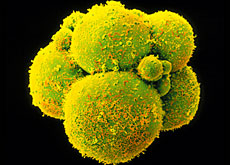Government puts human dignity first

The government says it wants to enshrine a law on human research in the constitution to improve current regulations it considers incomplete and inconsistent.
On Wednesday, Interior Minister Pascal Couchepin said the law would among other things ensure that preserving human dignity always came before research.
Scientific advances in recent years into ethically complex areas including the creation of biobanks – to store people’s DNA – have made the introduction of a uniform, federal law in Switzerland an urgent matter.
There are federal regulations governing some areas of human research, such as that on reproductive medicine and genetics but the 26 cantons are the ultimate authority in most cases.
“The laws differ between the cantons, so doing research in Bern for instance could be different than in Ticino,” Margreet Duetz, head of human research at the Federal Health Office, told swissinfo.
“And there are a lot of areas within the field of human research which are not regulated at all in most cantons.” This is the case with biological material. There are few binding rules stipulating how blood samples, taken for diagnostic reasons, can be used for research, she says.
Switzerland signed the 1997 Council of Europe Convention on Human Rights and Biomedicine but has yet to ratify the treaty.
According to the human rights body, “the convention is the first legally-binding international text designed to preserve human dignity, rights and freedoms, through a series of principles and prohibitions against the misuse of biological and medical advances.”
Duetz, whose office has taken the lead in writing the Swiss draft law, says it will be compatible with the convention.
Non-binding regulations
The concern is that Swiss scientists – unlike their counterparts in many other western European nations with clearly formulated laws – must often base their decisions on regulations that are legally non-binding.
The Federal Health Office says protecting human dignity is a priority since people are vulnerable in research situations where they divulge personal information for reasons other than their own benefit.
The new law will insist that assent is given before scientists get their hands on the data or put any samples under the microscope for purely scientific purposes.
Duetz says one of the most controversial subjects the new law will have to tackle is research on children whose cognitive powers are not fully developed, or anyone unable to act or judge for themselves.
“The new law does not forbid research on children but recognises that more strict regulations are needed for those who cannot take decisions alone.”
Parliament is expected to debate the draft article next year. If approved by both houses, the law would be put to a nationwide vote in 2009 as required by any change to the constitution.
swissinfo, Dale Bechtel with agencies
The Federal Health Office defines human research as not only that involving persons but also experiments on human embryos and foetuses and biological material of human origin such as tissue, cells, and bodily fluids.
It also includes research on deceased persons and studies using personal data.

In compliance with the JTI standards
More: SWI swissinfo.ch certified by the Journalism Trust Initiative












You can find an overview of ongoing debates with our journalists here . Please join us!
If you want to start a conversation about a topic raised in this article or want to report factual errors, email us at english@swissinfo.ch.